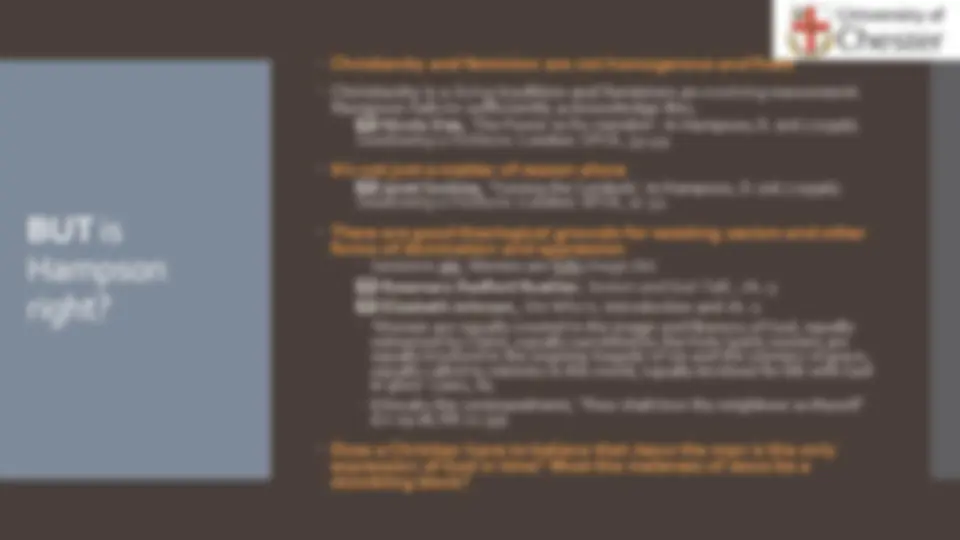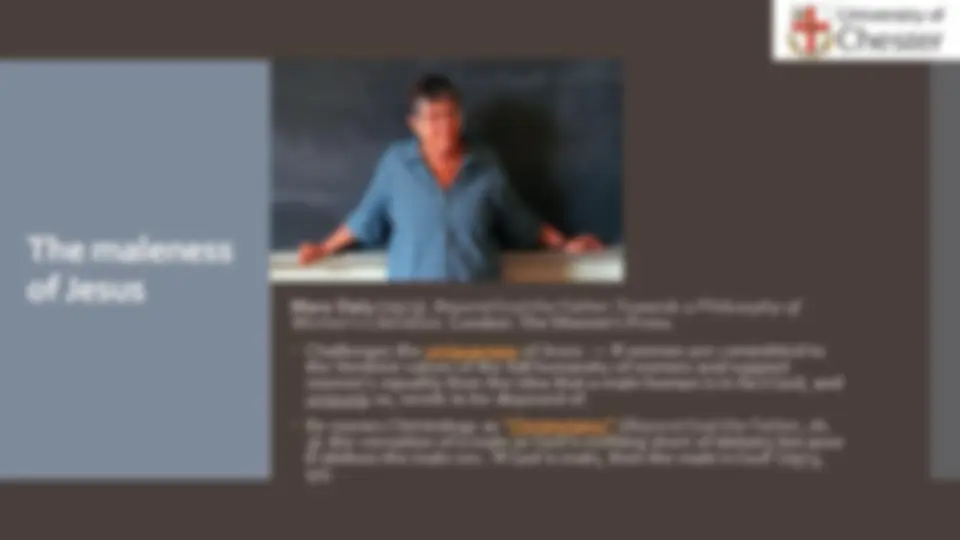










Study with the several resources on Docsity

Earn points by helping other students or get them with a premium plan


Prepare for your exams
Study with the several resources on Docsity

Earn points to download
Earn points by helping other students or get them with a premium plan
Community
Ask the community for help and clear up your study doubts
Discover the best universities in your country according to Docsity users
Free resources
Download our free guides on studying techniques, anxiety management strategies, and thesis advice from Docsity tutors
The question of whether Christianity is irredeemably sexist through the lens of feminist theology. The Associate Professor in Feminist Theology, Dr. Hannah Bacon, introduces the topic and its significance, providing examples of sexism within Christianity and discussing various perspectives on the issue. The document also offers resources for further study, including courses and publications.
Typology: Slides
1 / 14

This page cannot be seen from the preview
Don't miss anything!









Introducing you to Theology Why even ask the question? Theology Interesting and important question for Christians Concerns Christian ethics and social justice Important to assess the evidence for the claim in, for e.g. the Bible, Christian doctrines, Christian practice including the way the Church is organised Feminist theology Begins from a commitment to justice and gender justice specifically Seeks to challenge and change modes of belief and practice that are exposed as sexist What we offer at TRSChester – www.chester.ac.uk/trs BA Theology BA Philosophy, Ethics and Religion BA Religious Studies BA Theology and Religious Studies Feminist Perspectives in Christian Theology Contemporary Challenges to Christian Thinking Gender and Religion Christology from the Margins
What is sexism? Gender-based prejudice, bias or discrimination Interlinked with patriarchy European Institute for Gender Equality:
What is sexism? Elizabeth Johnson , She Who Is: The Mystery of God in Feminist Theological Discourse S exism is the ‘persistent violation’ of women’s humanity and ‘an omnipresent paradigm of unjust relationships’ (2002, 8). Rosemary Radford Ruether , Sexism and God-Talk: Toward a Feminist Theology Sexism is SIN Sexism describes the ‘gender privilege of males over females’ (1983, 165) Sexism is gender-based oppression
Daphne Hampson Swallowing a Fishbone: Feminist Theologians debate Christianity ‘For a feminist to be a Christian is indeed for her to swallow a fishbone. It must stick in her throat’ (1996, 1). Theology and Feminism (1990): The overarching problem = Christianity is an historical religion : ‘This history is not dispensable’ (1990, 9). 3 interrelated issues:
BUT is Hampson right? Christianity and feminism are not homogenous and fixed Christianity is a living tradition and feminism an evolving movement. Hampson fails to sufficiently acknowledge this. Nicola Slee , ‘The Power to Re-member’. In Hampson, D. (ed.) (1996). Swallowing a Fishbone. London: SPCK, 33-49. It’s not just a matter of reason alone Janet Soskice, ‘ Turning the Symbols’. In Hampson, D. (ed.) (1996). Swallowing a Fishbone. London: SPCK, 17-32. There are good theological grounds for resisting sexism and other forms of domination and oppression Sexism is sin****. Women are fully imago Dei. Rosemary Radford Ruether , Sexism and God-Talk , ch. 7; Elizabeth Johnson, She Who Is, Introduction and ch. 1: ‘Women are equally created in the image and likeness of God, equally redeemed by Christ, equally sanctified by the Holy Spirit; women are equally involved in the ongoing tragedy of sin and the mystery of grace, equally called to ministry in this world, equally destined for life with God in glory’ (2002, 8). It breaks the commandment, ‘Thou shalt love thy neighbour as thyself’ (Lv 19.18; Mt 22.39). Does a Christian have to believe that Jesus the man is the only expression of God in time? Must the maleness of Jesus be a stumbling block?
Virginia Fabella Filipino theologian ‘Christology from an Asian Woman’s Perspective’. In Fabella, Virginia and Sun Ai Lee Park (eds). We Dare to Dream , ed.. New York: Orbis. ‘Jesus’ liberating and humanizing message has meaning for all women struggling for full humanity and their rightful place in history, for Jesus’ message not only liberates but also empowers’ (3). In his humanity, Jesus reveals God as caring for the weakest and lowliest. ‘In his humanity Jesus has shown us what it means to be truly human, to have life abundantly, to be saved’ (3).
Is Jesus’ maleness really that important? Rosemary Radford Ruether (1983). Sexism and God-Talk It is Jesus’ message and liberative praxis that are redemptive; Jesus’ maleness caries no ultimate significance. Jesus’ ministry and praxis reveal a new humanity , a new and authentic way of being human (135). The Jesus of the Synoptic Gospels (i.e. Matthew, Mark and Luke) is ‘remarkably compatible with feminism’ (135). Jesus does not see himself as a political Messiah but as a SERVANT – To be a servant of God isn’t to consent to being dominated by others, it means that all people are servants equally. Jesus’ interactions with women reveal God’s new order as counter to sexism: Jesus speaks at the well with a Samaritan woman; a Syro-Phoenician woman is the prophet seeker who forces Jesus to concede redemption of the Gentiles; The woman with the issue of blood exhorts healing for herself. Jesus is a liberator who ‘calls for a renunciation, a dissolution, of the web of status relationships by which societies have defined privilege and deprivation.. His ability to speak as liberator does not reside in his maleness but in the fact that he has renounced this system of domination and seeks to embody in his person the new humanity of service and mutual empowerment’ (137). Jesus is not the only representation of the new humanity. ‘Christ, the liberated humanity, is not confined to a static perfection of one person two thousand years ago’ (138).
Conclusion Christianity does support sexism but we need to think carefully about how sexism combines with other axes of oppression in women’s lives. Christianity is not irredeemably sexist because women are fully imago Dei and Jesus’s message and praxis reveal God’s kingdom as a kingdom of radical inclusion. Failure to support the full humanity of women is sin. Jesus’ maleness is not theologically significant. It does not reveal anything meaningful about the nature of God.
Bibliography Daly, Mary (1973). Beyond God the Father. Towards a Philosophy of Women’s Liberation. London: The Women’s Press Fabella, Virginia (1989). Christology from an Asian Woman’s Perspective. In Virginia Fabella and Sun Ai Lee Park (eds). We Dare to Dream. Doing Theology as Asian Women. New York: Orbis Books. Grant, Jacquelyn (1989). White Women’s Christ and Black Women’s Jesus: Feminist Christology and Womanist Response. Atlanta: Scholars’ Press Grant, Jacquelyn (1993). The Sin of Servanthood. In Townes, Emile (ed). A Troubling in my Soul. Womanist Perspectives on Evil and Suffering. New York: Orbis. Hampson, Daphne (ed.) (1996).. Swallowing a Fishbone. Feminist Theologians Debate Christianity. London: SPCK Hampson, Daphne (1990). Theology and Feminism. Cambridge, MA: Basil Blackwell Isherwood, Lisa (2001). Introducing Feminist Christologies. London & New York: Sheffield Academic Press Johnson, Elizabeth (2002). She Who Is. The Mystery of God in Feminist Theological Discourse. New York: Crossroad Mitchem, Stephanie Y. (2002). Introducing Womanist Theology. New York: Orbis Riswold, Caryn D. (2011). Feminism and Christianity. Questions and Answers in the Third Wave. Cambridge : Lutterworth Press Ruether, R. R. (1983). Sexism and God-Talk. Toward a Feminist Theology. Boston: Beacon Press Slee, Nicola (2003). Faith and Feminism. An Introduction to Christian Feminist Theology. London: DLT Williams, Delores (2012). Black Theology and Womanist Theology. In Dwight N. Hopkins and Edward P. Antonio (eds). The Cambridge companion to Black theology. Cambridge: CUP, 58 - 72.